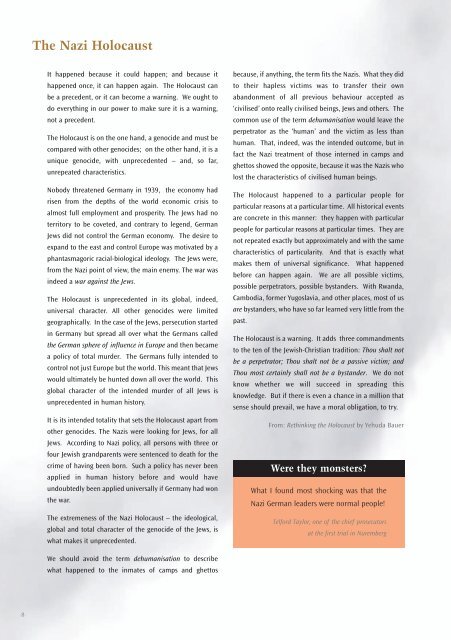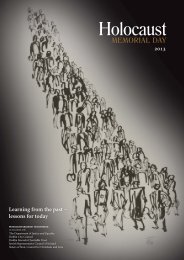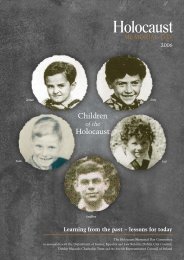Learning from the past ~ lessons for today - Holocaust Education ...
Learning from the past ~ lessons for today - Holocaust Education ...
Learning from the past ~ lessons for today - Holocaust Education ...
You also want an ePaper? Increase the reach of your titles
YUMPU automatically turns print PDFs into web optimized ePapers that Google loves.
The Nazi <strong>Holocaust</strong><br />
It happened because it could happen; and because it<br />
happened once, it can happen again. The <strong>Holocaust</strong> can<br />
be a precedent, or it can become a warning. We ought to<br />
do everything in our power to make sure it is a warning,<br />
not a precedent.<br />
The <strong>Holocaust</strong> is on <strong>the</strong> one hand, a genocide and must be<br />
compared with o<strong>the</strong>r genocides; on <strong>the</strong> o<strong>the</strong>r hand, it is a<br />
unique genocide, with unprecedented – and, so far,<br />
unrepeated characteristics.<br />
Nobody threatened Germany in 1939, <strong>the</strong> economy had<br />
risen <strong>from</strong> <strong>the</strong> depths of <strong>the</strong> world economic crisis to<br />
almost full employment and prosperity. The Jews had no<br />
territory to be coveted, and contrary to legend, German<br />
Jews did not control <strong>the</strong> German economy. The desire to<br />
expand to <strong>the</strong> east and control Europe was motivated by a<br />
phantasmagoric racial-biological ideology. The Jews were,<br />
<strong>from</strong> <strong>the</strong> Nazi point of view, <strong>the</strong> main enemy. The war was<br />
indeed a war against <strong>the</strong> Jews.<br />
The <strong>Holocaust</strong> is unprecedented in its global, indeed,<br />
universal character. All o<strong>the</strong>r genocides were limited<br />
geographically. In <strong>the</strong> case of <strong>the</strong> Jews, persecution started<br />
in Germany but spread all over what <strong>the</strong> Germans called<br />
<strong>the</strong> German sphere of influence in Europe and <strong>the</strong>n became<br />
a policy of total murder. The Germans fully intended to<br />
control not just Europe but <strong>the</strong> world. This meant that Jews<br />
would ultimately be hunted down all over <strong>the</strong> world. This<br />
global character of <strong>the</strong> intended murder of all Jews is<br />
unprecedented in human history.<br />
It is its intended totality that sets <strong>the</strong> <strong>Holocaust</strong> apart <strong>from</strong><br />
o<strong>the</strong>r genocides. The Nazis were looking <strong>for</strong> Jews, <strong>for</strong> all<br />
Jews. According to Nazi policy, all persons with three or<br />
four Jewish grandparents were sentenced to death <strong>for</strong> <strong>the</strong><br />
crime of having been born. Such a policy has never been<br />
applied in human history be<strong>for</strong>e and would have<br />
undoubtedly been applied universally if Germany had won<br />
<strong>the</strong> war.<br />
The extremeness of <strong>the</strong> Nazi <strong>Holocaust</strong> – <strong>the</strong> ideological,<br />
global and total character of <strong>the</strong> genocide of <strong>the</strong> Jews, is<br />
what makes it unprecedented.<br />
because, if anything, <strong>the</strong> term fits <strong>the</strong> Nazis. What <strong>the</strong>y did<br />
to <strong>the</strong>ir hapless victims was to transfer <strong>the</strong>ir own<br />
abandonment of all previous behaviour accepted as<br />
‘civilised’ onto really civilised beings, Jews and o<strong>the</strong>rs. The<br />
common use of <strong>the</strong> term dehumanisation would leave <strong>the</strong><br />
perpetrator as <strong>the</strong> ‘human’ and <strong>the</strong> victim as less than<br />
human. That, indeed, was <strong>the</strong> intended outcome, but in<br />
fact <strong>the</strong> Nazi treatment of those interned in camps and<br />
ghettos showed <strong>the</strong> opposite, because it was <strong>the</strong> Nazis who<br />
lost <strong>the</strong> characteristics of civilised human beings.<br />
The <strong>Holocaust</strong> happened to a particular people <strong>for</strong><br />
particular reasons at a particular time. All historical events<br />
are concrete in this manner: <strong>the</strong>y happen with particular<br />
people <strong>for</strong> particular reasons at particular times. They are<br />
not repeated exactly but approximately and with <strong>the</strong> same<br />
characteristics of particularity. And that is exactly what<br />
makes <strong>the</strong>m of universal significance. What happened<br />
be<strong>for</strong>e can happen again. We are all possible victims,<br />
possible perpetrators, possible bystanders. With Rwanda,<br />
Cambodia, <strong>for</strong>mer Yugoslavia, and o<strong>the</strong>r places, most of us<br />
are bystanders, who have so far learned very little <strong>from</strong> <strong>the</strong><br />
<strong>past</strong>.<br />
The <strong>Holocaust</strong> is a warning. It adds three commandments<br />
to <strong>the</strong> ten of <strong>the</strong> Jewish-Christian tradition: Thou shalt not<br />
be a perpetrator; Thou shalt not be a passive victim; and<br />
Thou most certainly shall not be a bystander. We do not<br />
know whe<strong>the</strong>r we will succeed in spreading this<br />
knowledge. But if <strong>the</strong>re is even a chance in a million that<br />
sense should prevail, we have a moral obligation, to try.<br />
From: Rethinking <strong>the</strong> <strong>Holocaust</strong> by Yehuda Bauer<br />
Were <strong>the</strong>y monsters<br />
What I found most shocking was that <strong>the</strong><br />
Nazi German leaders were normal people!<br />
Tel<strong>for</strong>d Taylor, one of <strong>the</strong> chief prosecutors<br />
at <strong>the</strong> first trial in Nuremberg<br />
We should avoid <strong>the</strong> term dehumanisation to describe<br />
what happened to <strong>the</strong> inmates of camps and ghettos<br />
8
















